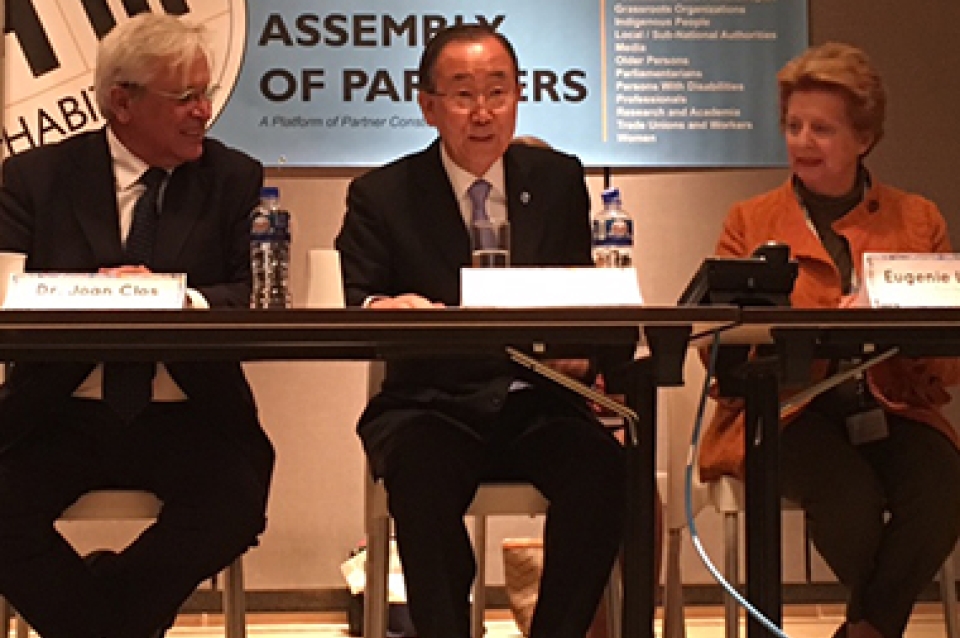October 24, 2016
Making a Global Commitment to Inclusive Cities

Eugenie Birch (right) and UN Secretary General Ban Ki-moon (center) at a meeting of the General Assembly of Partners at UN Habitat III
Stuart Weitzman School of Design
102 Meyerson Hall
210 South 34th Street
Philadelphia, PA 19104

Eugenie Birch (right) and UN Secretary General Ban Ki-moon (center) at a meeting of the General Assembly of Partners at UN Habitat III
Michael Grant
mrgrant@design.upenn.edu
215.898.2539
Watch
Eugenie Birch Speaks at UN Habitat III Closing Ceremony (Video)
UN Secretary General Ban Ki-moon Addresses the General Assembly of Partners (Video)
This century will see a substantial majority of the world’s population living in urban centers, and the challenges to both the public and private sectors are manifold. In working toward a coordinated global response, Eugenie Birch, Lawrence C. Nussdorf Professor of Urban Research and Education in the Department of City and Regional Planning and Co-Director, Penn Institute for Urban Research (IUR), led a 24-person delegation from Penn at Habitat III, the United Nations Conference on Housing and Sustainable Development held in Quito, Ecuador.
Held every 20 years, Habitat III brought together diplomats from UN member states, along with mayors and a wide variety of stakeholders, to adopt the New Urban Agenda, a set of standards for the way we build, manage, and live in cities. (Birch’s report on the Agenda was published this month in the UN Chronicle, the organization’s quarterly journal.)
Speaking at the Closing Ceremony in her capacity as President of the General Assembly of Partners (GAP), a coalition of 16 groups representing approximately a billion people around the world, Birch made a pledge of knowledge sharing, advocacy, testing innovation, and monitoring progress on behalf of the GAP in the UN’s overall effort to making cities more equitable and livable, even as they become more populous.
“We return to our homes armed with Secretary General Ban Ki-moon’s message that the battle for sustainable development will be won or lost in cities,” said Birch, who took the podium after the mayor of Quito, Mauricio Rodas, and was followed by the President of Ecuador, Rafael Correa.
Penn’s multifaceted participation included a series of well-attended talks by faculty and students at PennIUR’s booth in the exhibition area, where David Gouverneur, Professor of Practice in Landscape Architecture, launched the Spanish edition of Planning and Design of Informal Settlements (Routledge, 2014), the first book to address future informal settlements at the global scale.
Gouverneur and Birch also participated in the launch of the RENEWW (Renewable Energy, Nutrition, Water, Waste) Zone concept, highlighting the use of the circular economy to improve life in informal settlements and elsewhere, a project being developed with the US Department of State, National Renewable Energy Lab, PennIUR, and PennDesign. Birch was also a member of the US delegation led by US Department of Housing and Urban Development Secretary Julien Castro.
Also representing Penn Design were Stefan Al, Associate Professor of City and Regional Planning; Mark Alan Hughes, Faculty Director of the Kleinman Center for Energy Policy and Professor of Practice in City and Regional Planning; Historic Preservation Lecturer Eduardo Rojas, and 8 PhD students in City and Regional Planning. The broader Penn delegation included William Burke-White, Richard Perry Professor and Inaugural Director at Perry World House, Deputy Dean and Professor, Penn Law; Wendell Pritchett, Presidential Professor of Law and Education, Penn Law; Daniel Aldana Cohen, Assistant Professor of Sociology; PennIUR Advisory Board Member Paul Farmer; and Penn IUR Managing Director Amy Montgomery.
In the course of the weeklong summit, the GAP executive committee met with the Secretary General and GAP members made statements in key plenaries from 16 designated and named seats—an unprecedented degree of representation for major groups like the GAP.
“Normally only nine seats for major groups and three for other stakeholders are permitted,” Birch explained, underscoring the importance given to developing a broad-based urban agenda, “such are the ways of the UN where every word, gesture and seating arrangement has meaning.”